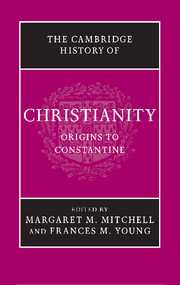Book contents
- Frontmatter
- Prelude: Jesus Christ, foundation of Christianity
- Part I The Political, Social and Religious Setting
- Part II The Jesus Movements
- Part III Community Traditions and Self-Definition
- Part IV Regional Varieties of Christianity in the First Three Centuries
- Part V The Shaping of Christian Theology
- 23 Institutions in the pre-Constantinian ecclēsia
- 24 Monotheism and creation
- 25 Monotheism and Christology
- 26 Ecclesiology forged in the wake of persecution
- 27 Towards a Christian paideia
- Part VI ‘Aliens’ become Citizens: towards Imperial Patronage
- Conclusion: retrospect and prospect
- Bibliographies
- Index
- Map 1. The Roman Empire in the time of Marcus Aurelius
- References
24 - Monotheism and creation
from Part V - The Shaping of Christian Theology
Published online by Cambridge University Press: 28 March 2008
- Frontmatter
- Prelude: Jesus Christ, foundation of Christianity
- Part I The Political, Social and Religious Setting
- Part II The Jesus Movements
- Part III Community Traditions and Self-Definition
- Part IV Regional Varieties of Christianity in the First Three Centuries
- Part V The Shaping of Christian Theology
- 23 Institutions in the pre-Constantinian ecclēsia
- 24 Monotheism and creation
- 25 Monotheism and Christology
- 26 Ecclesiology forged in the wake of persecution
- 27 Towards a Christian paideia
- Part VI ‘Aliens’ become Citizens: towards Imperial Patronage
- Conclusion: retrospect and prospect
- Bibliographies
- Index
- Map 1. The Roman Empire in the time of Marcus Aurelius
- References
Summary
Jewish heritage and emergent Christianity
A distinctive outcome of Christian theological reflection in the first few centuries was the doctrine of creatio ex nihilo. But the notion that God created the world ‘out of nothing’ was not simply inherited from an already well-developed Jewish or philosophical position; it was only clearly defined as monotheism was defended against Gnosticism and set in debate with philosophy.
Monotheism and creation in Judaism and in Greek philosophy
The early Christians shared the monotheism of the Jews. During a long period of theological reflection, Israel had worked out the conception of one unique and universal God who, in his absolute freedom and power, had created the world and all things living in it. God’s motive for creation was his goodness; his providence kept the world in being until his coming to pronounce final judgement upon it. A fully developed doctrine of monotheism is usually ascribed to Deutero-Isaiah in the sixth century bce: the pagan gods do not really exist, and their idols are worthless. In the third century bce, a new process took its beginning: the encounter between Judaism and Greek culture. In the debates which arose about the true God, the teaching of the Bible proved to be an asset for the Jews. There also was a strong tendency toward monotheism in Greek thought, winning more and more ground under Roman rule. Apart from philosophical speculation about first principles, it was a common assumption that the gods of paganism were nothing but single aspects or powers of the one supreme God.
Keywords
- Type
- Chapter
- Information
- The Cambridge History of Christianity , pp. 434 - 451Publisher: Cambridge University PressPrint publication year: 2006
References
- 1
- Cited by

